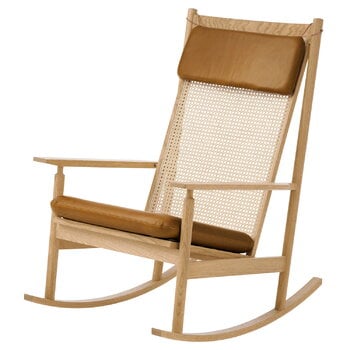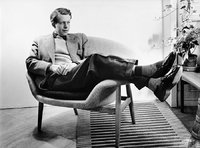Warm Nordic’s Swing rocking chair is Danish architect Hans Olsen’s elegant creation from the 1950s. Made of top-quality natural materials, the rocking chair boasts an airy, lightweight design that combines a simple, timeless frame in oak wood with a backrest in woven cane. The rocking chair sits quite low, but the high backrest makes the chair surely stand out in a room.
The rocking chair is finished with a headrest and a seat cushion upholstered in Camo Leathers’ Nevada aniline leather. Aniline is the softest and most natural type of leather, and it will develop a characterful patina over time – this will also depend on exposure to light and conditions of use. Please note that due to the natural materials, aniline leather and rattan, the rocking chair should not be placed in direct sunlight or right next to a heat source such as a fireplace.








